
Anna Maria Jopek
is a Polish musician strongly connected to the music of her country but highly
influenced by sounds, harmonies, rhythms that come from the jazz world.
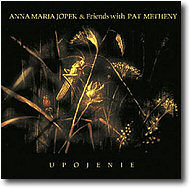 She
has increased her popularity also through a very good album recorded together
with Pat
Metheny (Upojenie
). In this album Anna Maria performs several completely rearranged songs
composed by the famous guitar player. She sings them in Polish language providing a
new extremely involving aspect. On the other side, on
this album Metheny, is particularly inspired also when he plays on songs composed by
other authors, i.e. the title track, where the way Pat starts the solo,
moving the harmony of half a tone forward, brands the piece with his
unmistakable trademark making it a little masterpiece.
She
has increased her popularity also through a very good album recorded together
with Pat
Metheny (Upojenie
). In this album Anna Maria performs several completely rearranged songs
composed by the famous guitar player. She sings them in Polish language providing a
new extremely involving aspect. On the other side, on
this album Metheny, is particularly inspired also when he plays on songs composed by
other authors, i.e. the title track, where the way Pat starts the solo,
moving the harmony of half a tone forward, brands the piece with his
unmistakable trademark making it a little masterpiece.
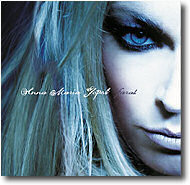 Recently
Anna Maria published a new album, which is also a DVD, called
Farat. It is recorded with her band formed by almost
internationally unknown musicians who look to play very good, with excellent
quality. In this live recording they are highly involved in the music and one
can appreciate how they get on well together and how they create good music also
enjoying. So we got the opportunity to ask some questions to Anna Maria Jopek
hoping to see her also in our country which is particularly loved by her.
Unfortunately, Italy is one of the few countries where she has not performed yet.
Recently
Anna Maria published a new album, which is also a DVD, called
Farat. It is recorded with her band formed by almost
internationally unknown musicians who look to play very good, with excellent
quality. In this live recording they are highly involved in the music and one
can appreciate how they get on well together and how they create good music also
enjoying. So we got the opportunity to ask some questions to Anna Maria Jopek
hoping to see her also in our country which is particularly loved by her.
Unfortunately, Italy is one of the few countries where she has not performed yet.
M.L.:
When you were just 19 you went to New York for studying at the Manhattan School of Music's Jazz Department. Then you got the diploma for piano at the Chopin's Academy of Music in Warsaw. Therefore you are both a classical and a jazz education. What are your main influences that contributed to your educational path?
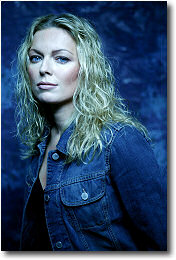 A.M.J.: I started on piano, playing classical music when I was six. I became fascinated by Ravel, Bach, certain nostalgic pieces by Chopin. And I discovered Mozart, whose music also suited my physical abilities. He must have had small hands, like mine. These were great, yet tough times. Almost as in the sport world. Win or die. Frankly, I think that only two people from my class at the Warsaw Academy deal with music in their life. Me being one of them. None of them on piano. Well, I do play piano while composing or arranging, I also played on some of the tracks here and there, yet never – or rarely – live. Manhattan School of Music was brief, yet intense episode. I was overwhelmed by the power and the vibe of the city, visited clubs, listened to my most beloved jazz artists, simply breathed the music. I still like going to New York a lot. My family is there. Things are happening. Although September 11th changed so much in my mind. Given choice I prefer not to travel much…In the end: my parents were in the famous folk music group in Poland. I was brought up with the traditional Polish songs, hundreds of years old. I still feel I'm strongly influenced by the ethnic elements. Surely you find lots of them on each of my records. Perhaps what I do is equally fed by all three: jazz, folk and classical. In that order.
A.M.J.: I started on piano, playing classical music when I was six. I became fascinated by Ravel, Bach, certain nostalgic pieces by Chopin. And I discovered Mozart, whose music also suited my physical abilities. He must have had small hands, like mine. These were great, yet tough times. Almost as in the sport world. Win or die. Frankly, I think that only two people from my class at the Warsaw Academy deal with music in their life. Me being one of them. None of them on piano. Well, I do play piano while composing or arranging, I also played on some of the tracks here and there, yet never – or rarely – live. Manhattan School of Music was brief, yet intense episode. I was overwhelmed by the power and the vibe of the city, visited clubs, listened to my most beloved jazz artists, simply breathed the music. I still like going to New York a lot. My family is there. Things are happening. Although September 11th changed so much in my mind. Given choice I prefer not to travel much…In the end: my parents were in the famous folk music group in Poland. I was brought up with the traditional Polish songs, hundreds of years old. I still feel I'm strongly influenced by the ethnic elements. Surely you find lots of them on each of my records. Perhaps what I do is equally fed by all three: jazz, folk and classical. In that order.
M.L.:
When did you discover to have a voice?
A.M.J.: Probably while singing in church, during the mass, playing guitar. I must have been 15 or so.
M.L.:
I watched the DVD
Farat, a great video. Except for Mino Cinelu, I didn't know the other musicians that play with you. They sounds very good musicians, the play every kind of music and they look very suitable to the way you play your music. How did you meet?
A.M.J.: We've been together for seven years or so. Especially with
Marek Napiorkowski, my guitarist and Henryk Miskiewicz, one of the most touching, emotional sax players alive.
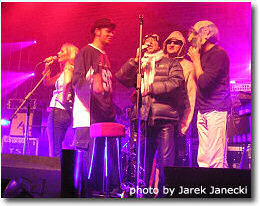 All of the guys in the group also lead their own projects while we're not touring. To me, being in this band for so many years has its huge advantages. Let me hope we managed to develop the sound and the approach that is unique. That blends many different styles.
Leszek Mozdzer is probably the most colorful, brave,
All of the guys in the group also lead their own projects while we're not touring. To me, being in this band for so many years has its huge advantages. Let me hope we managed to develop the sound and the approach that is unique. That blends many different styles.
Leszek Mozdzer is probably the most colorful, brave,
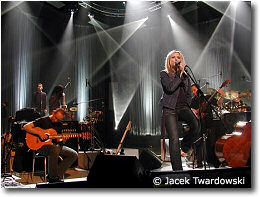 adventurous artist among Polish pianists. We play occasionally, we did the Metheny project, he's not in the band, but we recorded couple of albums together. Like the Emarcy record called
Barefoot for instance, where Tomasz Stanko also contributed a lot.
adventurous artist among Polish pianists. We play occasionally, we did the Metheny project, he's not in the band, but we recorded couple of albums together. Like the Emarcy record called
Barefoot for instance, where Tomasz Stanko also contributed a lot.
Bzim – the keyboardist – is my co producer on different projects. We usually put down basic tracks at his place in the small studio he owns. You should see it once, what a place. In fact you might have – it's featured on the DVD documentary. Along with Marek on guitar we discuss form, look for the optimal groove and so on.
Czarek Konrad on drums has been in the band in and out for all these years, being one of the most versatile, piano-influenced, sensitive drummers alive.
Robert Kubiszyn – the youngest in the band, playing both double bass and Fodera elecrtic – a complete virtuoso, joined three years ago. Gorgeous bunch of guys.
M.L.:
I noticed that when you started singing Metheny's
Follow Me, all the people stood up and sung with you. You made that piece a real hit!
A.M.J.: Well, credit Pat's music for it.
M.L.:
I think you also gave a great contribute...A bit of curiosity. The polish title is "Tam, Gdzie Nie Siega Wzrok". What does it mean?
A.M.J.: here's the sample of what it might all mean in English, my friend Magda Czapinska wrote
the original lyrics:
Further Than The Eye Can See
If you want to go further than the eye can see
Take a deep breath and make a first step.
Your heart might be scared, but you musn't look back.
That's the only life worth living.
Your goal is somewhere in the clouds.
Be brave! Go!
The world loves and rewards those, who go against the wind
into the unknown.
M.L.:
You sing in polish language. Don't you think that it's a bit difficult spread your music abroad? Have you planned to sing in english?
A.M.J.: I DID record an English album, it should be released by Universal later this year, I presume. Maybe next spring. Yet while I listen to some of my beloved artists – I can't understand a word – but still have goosebumps. Check
Angelique Kidjo out. Try Richard Bona. All the Brazilian musicians. How many people speak the language of
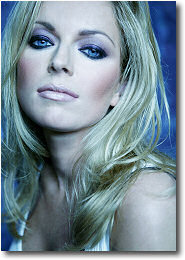 Cesaria Evora, for instance? Not to mention Italian opera or…Zucchero for that matter. Go to London and find out who speaks Italian. Sometimes it's more about the mood. On the other hand I would love people to feel "at home", understand. I do sing some songs in English live. And now the album….we'll see what happens. Let's wait.
Cesaria Evora, for instance? Not to mention Italian opera or…Zucchero for that matter. Go to London and find out who speaks Italian. Sometimes it's more about the mood. On the other hand I would love people to feel "at home", understand. I do sing some songs in English live. And now the album….we'll see what happens. Let's wait.
M.L.:
Actually, you are right! I love brazilian music
and I do not understand any portuguese word! You pay lot of attention to the natural sounds. Every sound has its space, its time and one can clearly hear it and how it influences the global sound. How the arrangements come up?
A.M.J.: It's different each time, depends on whose song it is. Generally the composer – if it's me, my husband
Marcin, or Marek – gives the general idea. If it's purely acoustic music then we just sit down and try different things out. If it has like 100 tracks to it – then
Bzim and I and Marcin spend weeks or sometimes months trying to figure it out what would work best. Then it comes to mixing that Marcin usually does with the chosen ingeneer. He decides what would eventually happen with the song, I trust him completely. I DO have some strong feelings about vocal effects and things like that, though. We are also maniacs about how the acoustic instruments should sound. It will be especially featured on our next album.
M.L.:
After listening to
Upojenie I have to remark that Metheny's music sounds as if it has been written right for you. Your husband
Marcin Kydrynski wrote lyrics. How did you get the idea to make this project and how was the collaboration with Pat?
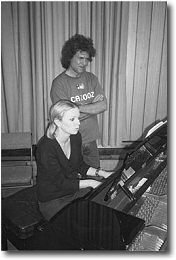 A.M.J.: Marcin wrote lots of lyrics to our songs and also a bunch of the beautiful music. Try
Biel or
Piosenka Dla Stasia, for instance. He's been also mad about Pat's music for years. He's been running a radio show for 15 years now. I kind of grew up with the music I heard on that show. Pat, Sting, Jarrett…Who on Earth could predict that I would marry this fellow and that we would make this unique album with our greatest musical hero. It's all so…weird, yet somehow I'm…not surprised. It all seems so natural. But it also makes me one of the happiest people on the planet. To answer your question: Marcin sent a proposal to metheny's agent back in 1998 and received a polite note saying:
the girl has a pleasant voice, but Pat Metheny doesn't feel he might get involved in the project. Years later, encouraged by the Warner Music Poland we tried again. We actually drove Three days from Warsaw to Molde festival in Norway in 2001 where Pat was an Artist in Residence. We met backstage and could hardly speak, we were so stunned with his very presence.
A.M.J.: Marcin wrote lots of lyrics to our songs and also a bunch of the beautiful music. Try
Biel or
Piosenka Dla Stasia, for instance. He's been also mad about Pat's music for years. He's been running a radio show for 15 years now. I kind of grew up with the music I heard on that show. Pat, Sting, Jarrett…Who on Earth could predict that I would marry this fellow and that we would make this unique album with our greatest musical hero. It's all so…weird, yet somehow I'm…not surprised. It all seems so natural. But it also makes me one of the happiest people on the planet. To answer your question: Marcin sent a proposal to metheny's agent back in 1998 and received a polite note saying:
the girl has a pleasant voice, but Pat Metheny doesn't feel he might get involved in the project. Years later, encouraged by the Warner Music Poland we tried again. We actually drove Three days from Warsaw to Molde festival in Norway in 2001 where Pat was an Artist in Residence. We met backstage and could hardly speak, we were so stunned with his very presence.
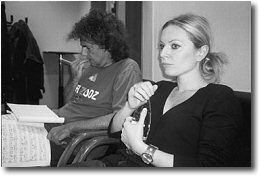 Yet somehow we managed to speak up, pass him my Barefoot album and explain what we dreamt of. I figure we must have looked so convincing that Pat decided to at least not throw the album away immediately.
Yet somehow we managed to speak up, pass him my Barefoot album and explain what we dreamt of. I figure we must have looked so convincing that Pat decided to at least not throw the album away immediately.
It took another year and the half before we got to the studio and no one would EVER believe how many obstacles we faced. This was the most rewarding and beautiful time in our lives, yet at the same time the most exhausting, we hardly survived the tension and the suspense. When Pat eventually arrived in Warsaw for a week in October 2002 it all vanished – and the purest joy of making music with your greatest hero of all time remained. How he works is another story. It would be wise to publish a book on that one day. It's unlikely we will ever meet someone like him again. He's from another world.
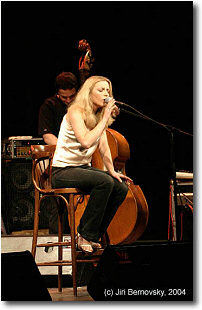 M.L.:
You have taken part in several Jazz Festivals. How is your music considered in those fields?
M.L.:
You have taken part in several Jazz Festivals. How is your music considered in those fields?
A.M.J.: We are happy to have great audiences. Last summer we played in Vienna in front of 5000 people who were so warm, sensitive, enthusiastic. I suppose there might be a certain feeling of sincerity in our music that appeals to different audiences…even when they don't understand a word. I try to help them, though, singing also some Mozart in Latin or just vocalise over my version of his adagio from A Major Piano Concerto. Also – maybe people simply like the idea of things "happening" on stage. We never ever played the same concert twice. Each tune is always approached differently. I do not like feeling safe on stage. We do get bored quite quickly. We have to create our own challenges within the band. Try dangerous paths. The audiences seem to appreciate that.
M.L.:
What is the relationship you have with jazz music?
A.M.J.: I still listen to it a lot. I love Wynton Marsalis, if that's what you're asking about. I respect
Duke and Armstrong. I would never dare to call my music jazz.
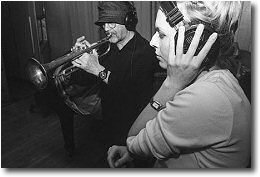 M.L.:
You played together with several jazz musicians like Tomasz Stanko,
Joe Lovano,
Pat Metheny…Is there a particular experience you like to remember?
M.L.:
You played together with several jazz musicians like Tomasz Stanko,
Joe Lovano,
Pat Metheny…Is there a particular experience you like to remember?
A.M.J.: Tomasz and I did three records together – or should I say he agreed to be be my guest. We also played a couple of concerts…he's been my mentor for years, it's such an honor to work with him each time. He's now under severe ECM contract, so I think I will simply have to miss him. What a sound, what an expression, creativity…
Joe Lovano. I had an unbelieveable pleasure of meeting him once, while we performed together at the Jazz Jamboree 40th Anniversary Gala in Warsaw back in '98. He's got this gift only greatest musicians have: with his sound and phrase he sort of "explains" every musical situation. Being it the most complex tune. He comes in and makes it perfectly clear. With such an incredible feel for melody.
Pat. This is a different story. There is no one on Earth that I love or respect more in music. He's, as my husband says, a contemporary Mozart. Playing such difficult, sophisticated music and making it so approachable at the same time. Wait till you hear his Group's new album. You have never ever heard anything like it.
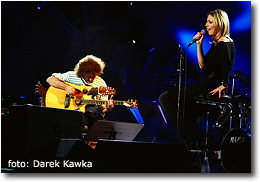 There's nothing I love more than his compositions, his ballads mostly. And the way he improvises: sometimes I don't really know where the written melody ends and when his solo starts. He composes most beautiful tunes on the spot, while improvising. Check beyond The Missouri Sky out – perhaps my most favorite record of all time.
There's nothing I love more than his compositions, his ballads mostly. And the way he improvises: sometimes I don't really know where the written melody ends and when his solo starts. He composes most beautiful tunes on the spot, while improvising. Check beyond The Missouri Sky out – perhaps my most favorite record of all time.
To actually play with him, listen to him interpret our music, share the stage with him – was an experience incomparable to anyhing. Dangerous, to some extent. Think about it: achieve the ultimate fulfillment, total musical ecstasy, make all the wildest dreams come true at the age of thirty. What next? There's nothing worse than having no dreams left. So – we have. Pat, Marcin and myself – we actually met last June and talked about making another project together in the future. Hoorray! Now I have a dream again!!!
M.L.:
Let we hope it will come true soon...You play in almost 100 concerts a year, by now you get used to perform in front of thousands of people (5000 in Warsaw in
2001, 8000 in Augustow in
2003…). But you also play in small clubs …What is the place you prefer?
A.M.J.: each one is different. Generally I feel better in the intimate setting. 200 people is my kind of audience. I have the feeling I might truly embrace them with our music. Reach them, give them what the came for.
M.L.:
This current year you performed at
Carnegie Hall where the best musicians of all the time have performed. How did you feel performing on that stage? Would you like to tell us that experience?
A.M.J.: I was just a guest there, singing three songs, yet it was like entering a shine. Unbelieveable. I do think that the walls absorb and transmit energy. That the venues have souls. What can compare to Carnegie Hall? Where ALL different styles of the greatest music ever have been played for the century.
M.L.:
What do you try to transmit through your music?
A.M.J.: I am a musician, primarily. To me music itself remains the fundamental mystery, an unanswered question. I try to find the best solutions…don't ask for any further explanations, please. This quest does never end. And it's also what makes it exciting.
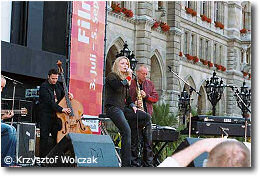 M.L.:
Is there anyone you would like to play with?
M.L.:
Is there anyone you would like to play with?
A.M.J.: Sting. Gee, how I love him. My husband and I had this strange experience…no, not strange – this was healing. Life-saving. We were at Sting's house in Tuscany on September 11th, when he recorded what was later released as All This Time project. Earlier I had an honor of opening for him in 2000. How small kid was I back then, it makes me feel embarassed. Now when chances are I became slightly more mature I dream and pray to maybe record a song or two together with this man. But hey, let's wait couple of years. Because if, by some miracle, I will do that – THEN what?
M.L.:
What have you planned to do in the early future?
A.M.J.: Let's see what happens with the English record. A weird experience. Marcin and I plan to record an acoustic set of our own tunes early next year. We're currently in the process of writing the last songs. I'm touring in Germany now, going to the States from here and then we will be in France in December. We have lots of concerts scheduled in Poland. But first of all I would love to stay with my kids more. Nothing, not even music could replace their presence.
M.L.:
When will you come to Italy?
A.M.J.: Not surprisingly – Italy is my favorite country on Earth. Remember that Cinema Paradiso remains my most beloved movie. So we try to visit Italy as often as possible. We go skiing there, to Val Gardena. We visit Venice every now and then. Drive around your fabulous lakes in the north…actually one of our most favorite places is a small town of Camogli, what a beautiful, lazy spot. Marcin and I we dream of maybe traveling south. Below Naples. But I bet you're asking about concerts…hmm. I am not the right person to be asked this question, don't you think? I wouldn't have to be asked twice. You know what I mean?
I know, I know...and I hope that after this interview someone will invite you
in our Country so that your music could also be appreciated in Italy as it deserves.
Thank you for this nice interview and I wish you to keep on dreaming...


